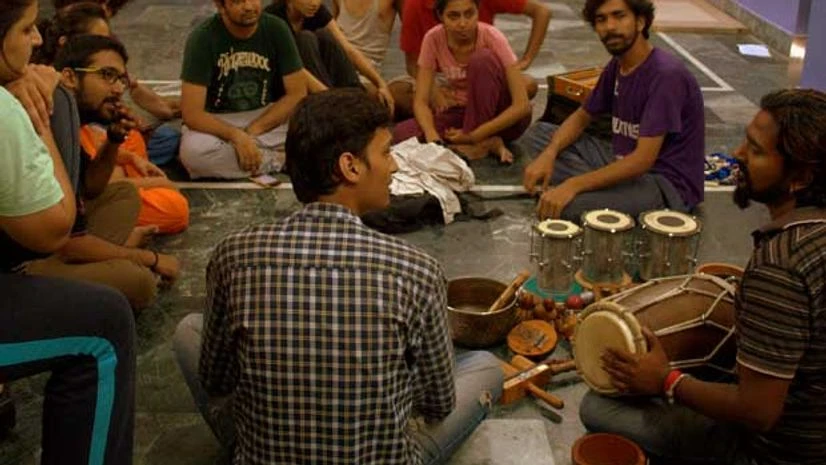One has come across festivals being defined as the “biggest yet”, “largest so far”, and with other similar gargantuan descriptions of scale. However, Quasar Thakore Padamsee, or Q, as he is fondly known, describes Thespo as “the thicker festival”. “I mean that in terms of the number of interactions, performances and focus on various facets of theatre,” he says. Currently in its 17th edition, Thespo, a unique festival for young theatre practitioners, promises an eclectic lineup with 30 events, including five plays, seven special sections, international collaborations, four platform performances, two fringe performances, 10 workshops and four music acts.
This year, the theatre fest, organised by Padamsee’s QTP under the aegis of Theatre Group Bombay, will try to connect the dots between the traditional and the contemporary, which is evident in its choice of venues as well: from the iconic Prithvi Theatre, from where it began its journey in 2008, to the Hive, which is one of the hottest new cultural hubs in Mumbai.
From a single one-act play in the first year to a whopping 159 entries from India and Pakistan this year, the festival has come a long way. “But what’s remained constant is the desire to give young performers a space to perform, to help them stay relevant by exposing them to workshops and to introduce the audience to different kinds of theatre,” says Padamsee. So, one will be able to watch five full-length plays in Marathi, khadi boli, Bangla and Hindi put together by brand new theatre groups and multimedia art companies. There’s the lighthearted Chitthi by Pune’s Theatre Dilse Group, where an illiterate woman is trying to catch her cheating husband by attempting to decipher a handwritten letter; also worth a watch is Lassanwala by Little Creative Minds from Mumbai about a staunch Brahmin and events that shake his belief in the caste system. “All the performances address the issues that surround us — be it the caste system, mental health or even how Bollywood has taken over our lives,” says Padamsee.

One of the key objectives was to bring more international talent to the festival and explore different theatre formats. For the first time, Indian audiences will be treated to something known as the “Hip Hopera” through Sebastian Hein’s Brotherhood. “He is from Canada and has come up with a great way of telling stories through hip-hop. Heins will also be conducting a workshop on his art,” explains Padamsee. Another interesting project is by Italy-born Daniele Bartolini. “Bartolini’s The Stranger is an audience specific theatre experience. It is designed for one spectator at a time and transforms the lone audience member into a performer. So, the audience member guides you into the next space or scene,” says Padamsee. A review by Vancouver-based writer Chelsey Stuyt called The Stranger “an immersive roving site piece that takes an audience of one on a journey across the Commercial Drive neighbourhood. Staged as a series of connected encounters, each stranger guides you to your next destination as they share a quiet moment of connection.”This year, the theatre fest, organised by Padamsee’s QTP under the aegis of Theatre Group Bombay, will try to connect the dots between the traditional and the contemporary, which is evident in its choice of venues as well: from the iconic Prithvi Theatre, from where it began its journey in 2008, to the Hive, which is one of the hottest new cultural hubs in Mumbai.
From a single one-act play in the first year to a whopping 159 entries from India and Pakistan this year, the festival has come a long way. “But what’s remained constant is the desire to give young performers a space to perform, to help them stay relevant by exposing them to workshops and to introduce the audience to different kinds of theatre,” says Padamsee. So, one will be able to watch five full-length plays in Marathi, khadi boli, Bangla and Hindi put together by brand new theatre groups and multimedia art companies. There’s the lighthearted Chitthi by Pune’s Theatre Dilse Group, where an illiterate woman is trying to catch her cheating husband by attempting to decipher a handwritten letter; also worth a watch is Lassanwala by Little Creative Minds from Mumbai about a staunch Brahmin and events that shake his belief in the caste system. “All the performances address the issues that surround us — be it the caste system, mental health or even how Bollywood has taken over our lives,” says Padamsee.

Dastaan-e-Bhookh
Then there is Australia’s Glenn Hayden who will be presenting Stimulated Voices on the closing night. For the piece, he was required to meet young theatre practitioners and get them to write lyrics, poetry or a piece of prose. “We started working together a couple of days ago and now have an amazing collection. The idea is to give a platform to nine individual voices and transform the written word into a performance,” says Hayden. “All these voices are beautifully linked through their awareness of themselves and those around them.”
Theatre practitioners can also look forward to workshops by veterans like Padma Damodaran and Tim Smith. While Damodaran will unravel the myriad layers to The Navrasas, Smith, Rav Sanghera and Madeleine O’Wright will explore how multimedia can be used to form compelling narratives.
Thespo 17 will be held between December 7 and 13 in Mumbai at The Godrej Theatre at the NCPA, Prithvi Theatre and The Hive

)
